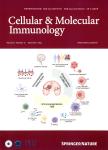STING regulates BCR signaling in normal and malignant B cells
圈套调整在正常、恶意的 B 房间发信号的 BCR作者机构:The Wistar Institute3601 Spruce StreetPhiladelphiaPA 19104USA Department of Malignant HematologyH.Lee Moffitt Cancer Center&Research InstituteTampaFL 33612USA Department of Chemistry&BiochemistryUniversity of Notre DameNotre DameIN 46556USA
出 版 物:《Cellular & Molecular Immunology》 (中国免疫学杂志(英文版))
年 卷 期:2021年第18卷第4期
页 面:1016-1031页
核心收录:
学科分类:1001[医学-基础医学(可授医学、理学学位)] 100102[医学-免疫学] 10[医学]
基 金:supported by grants(R01CA163910 and R01CA190860)from the NIH/NCI
主 题:STING BCR ER-associated degradation CLL Plasma cells
摘 要:STING is an endoplasmic reticulum(ER)-resident protein critical for sensing cytoplasmic DNA and promoting the production of type Ⅰ interferons;however,the role of STING in B cell receptor(BCR)signaling remains *** generated STING V154M knock-in mice and showed that B cells carrying constitutively activated STING specifically degraded membrane-bound IgM,Ig a and Igβ via SEL1L/HRD1-mediated ER-associated degradation(ERAD).B cells with activated STING were thus less capable of responding to BCR activation by phosphorylating Igα and Syk than those without activated *** immunized with T-independent antigens,STING V154M mice produced significantly fewer antigen-specific plasma cells and antibodies than immunized wild-type(WT)*** further generated B cell-specific STING^(KO) mice and showed that STING^(KO) B cells indeed responded to activation by transducing stronger BCR signals than their STING-proficient *** B cell-specific STING^(KO) mice were T-independently immunized,they produced significantly more antigen-specific plasma cells and antibodies than immunized STIN^(WT)*** both human and m ouse IGHV-unmutated malignant chronic lymphocytic leukemia(CLL)cells downregulated the expression of STING,we explored whether STING downregulation could contribute to the well-established robust BCR signaling phenotype in malignant CLL *** generated a STING-deficient CLL mouse model and showed that STING-deficient CLL cells were indeed more responsive to BCR activation than their STING-proficient *** results revealed a novel B cell-intrinsic role of STING in negatively regulating BCR signaling in both normal and malignant B cells.




